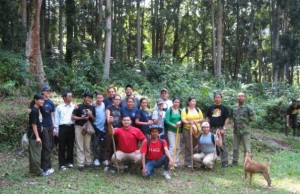$1 million AID grant to promote UTEP program in environmental conservation in communication
|
EL PASO – When Stacey Sowards’ parents moved to tropical East Kalimantan in Indonesia during her last year at Colorado College, little did she know that the new experience would guide her future academic achievements. Sowards, an Associate Professor in the Department of Communication at the University of Texas at El Paso, first experienced Indonesia in 1994. It was not long before she started teaching Intercultural Communication at different locations in East Kalimantan. She wrote her doctoral dissertation about environmental organizations working to protect orangutans in Indonesia. Sowards received a Fulbright scholarship in 2000 that allowed her to live in Indonesia for about a year and she has returned numerous times since then.

